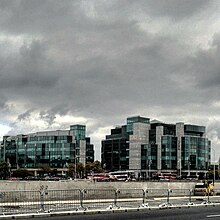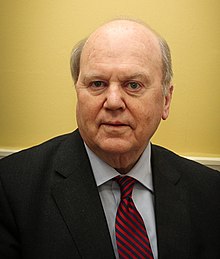
An Irish Section 110 special purpose vehicle (SPV) or section 110 company is an Irish tax resident company, which qualifies under Section 110 of the Irish Taxes Consolidation Act 1997 (TCA) for a special tax regime that enables the SPV to attain "tax neutrality": i.e. the SPV pays no Irish taxes, VAT, or duties.
Section 110 was created in 1997 to help International Financial Services Centre (IFSC) legal and accounting firms compete for the administration of global securitisation deals, and by 2017 was the largest structured finance vehicle in EU securitisation.[1][2] Section 110 SPVs have made the IFSC the third largest global Shadow Banking OFC.[3] While they pay no Irish tax, they contribute €100 million annually to the Irish economy in fees paid to IFSC legal and accounting firms.[4][5]
In June 2016, it was discovered that US distressed debt funds used Section 110 SPVs,[6] structured by IFSC service firms,[7] to avoid Irish taxes on €80 billion[8] of Irish domestic investments.[9][10][11][12] The cost to the Irish exchequer has been material.[13][8] Despite the scale of the avoidance, Irish Revenue attempted no investigation or prosecution.[14] The Irish Government's response to the scandal in 2016–2017 was unusual, closing some loopholes but leaving others open, including a five-year capital gains tax (CGT) exemption to aid alternative restructuring.[15][16][17] The affair is a source of dispute.[18][19][20][21][22][23]
The abuses were discovered because Section 110 SPVs file public accounts with the Irish CRO. In 2018, the Central Bank of Ireland upgraded the L–QIAIF, to give the same tax-free structure on Irish assets held via debt as the Section 110 SPV, but without having to file public accounts with the Irish CRO.

Academic research in 2016–2018 showed IFSC Section 110 SPVs are largely unregulated,[24][25] operating like brass plate companies with low supervision from the Revenue or the Central Bank of Ireland.[26] It showed Section 110 SPVs were used by sanctioned/prohibited Russian banks.[27][28][29] A June 2017 study published in Nature listed Ireland as one of the global Conduit OFCs which use SPVs to route funds to tax havens.[30] In March 2018, the Financial Stability Forum showed SPVs had made Ireland the 3rd largest Shadow Banking OFC.[31] In June 2018, tax academics showed Ireland was the world's largest tax haven.[32][33][34][35]
- ^ "Ireland is top Eurozone jurisdiction for SPVs". Irish Independent. 19 August 2017.
- ^ "Structured Finance (Section 110)". PWC Ireland. 2016.
- ^ "Ireland has world's fourth largest shadow banking sector, hosting €2.02 trillion of assets". Irish Independent. 18 March 2018.
- ^ "Ireland: The Leading European Jurisdiction for SPVs, Structured Finance and Securitised Structures" (PDF). Irish Debt Securities Association. 2016.
- ^ Cite error: The named reference
lawyerwas invoked but never defined (see the help page). - ^ Cite error: The named reference
sundaybpwas invoked but never defined (see the help page). - ^ Cite error: The named reference
lawwas invoked but never defined (see the help page). - ^ a b Cite error: The named reference
sdwas invoked but never defined (see the help page). - ^ Cite error: The named reference
l1was invoked but never defined (see the help page). - ^ Cite error: The named reference
l2was invoked but never defined (see the help page). - ^ Cite error: The named reference
l3was invoked but never defined (see the help page). - ^ Cite error: The named reference
ifscwas invoked but never defined (see the help page). - ^ Cite error: The named reference
sd2was invoked but never defined (see the help page). - ^ Cite error: The named reference
nnnwas invoked but never defined (see the help page). - ^ Cite error: The named reference
kpmg1was invoked but never defined (see the help page). - ^ Cite error: The named reference
fry1was invoked but never defined (see the help page). - ^ Cite error: The named reference
fry2was invoked but never defined (see the help page). - ^ Cite error: The named reference
zzawas invoked but never defined (see the help page). - ^ Cite error: The named reference
zzbwas invoked but never defined (see the help page). - ^ Cite error: The named reference
sd3was invoked but never defined (see the help page). - ^ Cite error: The named reference
dmwwas invoked but never defined (see the help page). - ^ Cite error: The named reference
noonanwas invoked but never defined (see the help page). - ^ Cite error: The named reference
noo1was invoked but never defined (see the help page). - ^ Cite error: The named reference
jim1was invoked but never defined (see the help page). - ^ Cite error: The named reference
jim2was invoked but never defined (see the help page). - ^ Cite error: The named reference
imfwas invoked but never defined (see the help page). - ^ Cite error: The named reference
rus1was invoked but never defined (see the help page). - ^ Cite error: The named reference
rus2was invoked but never defined (see the help page). - ^ Cite error: The named reference
rus3was invoked but never defined (see the help page). - ^ Cite error: The named reference
naturewas invoked but never defined (see the help page). - ^ "Global Shadow Banking and Monitoring Report: 2017" (PDF). Financial Stability Forum. 5 March 2018. p. 30.
Jurisdictions with the largest financial systems relative to GDP (Exhibit 2-3) tend to have relatively larger OFI [or Shadown Banking] sectors: Luxembourg (at 92% of total financial assets), the Cayman Islands (85%), Ireland (76%) and the Netherlands (58%)
- ^ Gabriel Zucman; Thomas Torslov; Ludvig Wier (June 2018). "The Missing Profits of Nations". National Bureau of Economic Research, Working Papers. p. 31.
Appendix Table 2: Tax Havens
- ^ "Zucman:Corporations Push Profits Into Corporate Tax Havens as Countries Struggle in Pursuit, Gabrial Zucman Study Says". Wall Street Journal. 10 June 2018.
Such profit shifting leads to a total annual revenue loss of $200 billion globally
- ^ "Ireland is the world's biggest corporate 'tax haven', say academics". Irish Times. 13 June 2018.
New Gabriel Zucman study claims State shelters more multinational profits than the entire Caribbean
- ^ Aidan Regan (25 April 2019). "Ireland is a tax haven — and that's becoming controversial at home". Washington Post. Retrieved 25 April 2019.